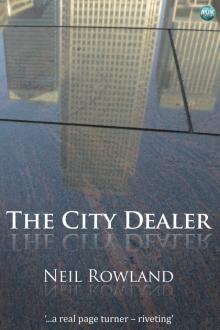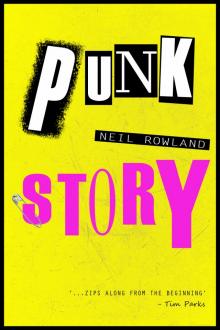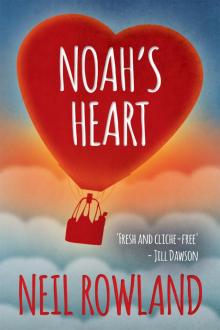- Home
- Neil Rowland
Noah's Heart Page 5
Noah's Heart Read online
Page 5
I was prepared to stay in hospital overnight; even longer. Wasn’t this the usual deal? I’d brought along my toiletries and a change of clothes. My test results would have to be processed and then the medics would study them closely. Then I’d have to wait for Mr Wickham and his cronies to hit on some smart ideas. This is what I came to expect of a hospital visit. They would put me back into ill-fitting pyjamas.
Anyway, a few more hours went painfully by. They called me back into Wickham’s office. I was getting a rush from all the instant tea and factory made Battenburg cake, that I’d been taking in the waiting room. I didn’t know what the consultant’s verdict was going to be, but the nurse said I would not be staying in the ward. Obviously they offered a one-hour service in this hospital.
“Come in then, come in,” Mr Wickham summoned. He was still perched on that creaky chair behind his battered desk, as if he hadn’t moved all day. He looked even more fatigued than before though, as if he’d examined a dozen wards during our pause. He was taking another sortie through my paperwork; as if it could be more positive in a different combination, or would eventually disintegrate. The rims of his eyes had turned iodine violet; the eyes of an all-night horror movie fanatic.
“Please sit yourself down, Mr Sheer,” he offered, with a strange and recondite gesture.
I nodded like a grateful peasant as I edged towards him and ducked on to the chair.
“With luck,” he began, “you will be catching your early train back to Bristol.”
“Oh really?” I said. And an early bath too?
“You may even be home for a reasonable bedtime.”
“You don’t know my house,” I replied, attempting levity.
“Ah ha, yes.”
So I wasn’t comforted by his approach. Take drugs, drop out, as I should have done years ago. Now my daughter seems to be following that example.
“Yes, so, we have enough test data back to say what may have malfunctioned with you,” he said, “back there, when you were out shopping in Bristol that day.”
He shook a fresh pile of documents alarmingly, as if trying to rearrange the sense of them.
“Your surgery was a complete success,” he stated.
“Oh?”
“The angiogram today did not reveal any further problem with your heart. No hardening or constriction of the arteries... no further damage to the tissue of the muscle... This was not another episode of angina pectoris. It’s as you originally surmised,” he said, as if to praise me.
“Is that right?”
“I examined the video screen myself... I read through all this information.”
“You didn’t find another blockage?” I wondered. “You don’t need to unplug the veins?” I felt like a pretentious plumber.
“No even non-invasive procedures are relevant. Your heart appears a trifle swollen, yet it is in remarkably good condition.”
“Good condition?” I said.
“We were really pleased with it,” he told me. His glance rushed towards me, as if noticing a spot of colour in my cheeks. “That’s right, the swelling was caused by the recent trauma, not through any mistakes during the surgical procedure.”
“That’s good news then,” I remarked. But his voice and expression was sending me a different message. I couldn’t avoid the negative vibrations. There was a dread over his elongated stiffness, like a black rag draped over a judge’s head.
“Your heart remains in satisfactory shape,” he repeated.
“Something hit me very hard,” I protested.
“Yes, no doubt you have that idea after the incident. I don’t wish to confuse you, Mr Sheer,” he argued, “or to obscure our justifiable concern, but...”
He rattled on.
I was uneasy, losing his reason as I once lost consciousness. His eyes avoided me as a fly avoids a rolled newspaper. His fringe tumbled down from his forehead in a moment of anxiety. The hair style was a classic Bobby Charlton in reverse; the sweep back. It would be extremely fortunate if I ever lost that much hair.
“So what’s wrong? Don’t you know?” I interrupted.
“Of course we are confident that we know,” he replied. This came as a disgruntled parenthesis.
“Then why don’t you come right out and tell me?”
Finally he was treating me to full eye contact. His expression communicated ‘you are not going to like this’. How entirely correct he was with that diagnosis.
“The problem you experienced has been isolated to a minor surgical component,” Wickham said.
“You didn’t leave a scalpel inside me, did you?” I exclaimed in horror.
The consultant studied me in surprise. “No, this was not an implement left behind post operatively.”
“Then what are you telling me is wrong? There’s something wrong, isn’t there.” Was it ethical to keep me guessing? A new wave of anxiety didn’t unglue me from the plastic seat.
“Yes, yes, well. The hospital cannot take direct responsibility for what is outside its jurisdiction,” he began. “This matter has been fully presented to our insurance claims board. They assure me that there is no culpability or obligation on this hospital’s part.”
“I’m losing you. Which part?”
“We are fully covered in these eventualities.”
“In what way are you not to blame?” He was pushing me into the territory of empirical philosophy. But I was no longer a gullible eighteen year old.
“Blame would be an inappropriate word in this case,” he replied; he lifted and hardened his tone.
“What exactly did you screw up?” Nails were more appropriate than screws.
“We treated you in an entirely professional and competent way. I just have to explain a few technical points to you before...”
“Are you saying I am to blame for this?” It was as bad as divorce. The ultimate weapon still disturbs my dreams.
“Any blame can be attached to the company.” He registered my bafflement. “The particular company that manufactured these components.”
“Which components are you talking about?”
“These devices; these artificial plastic heart valves.”
I felt my chin wobble and my lips twitching, as I mumbled over a response to this. These wretched plastic heart valves made their first appearance in my imagination (if not in my body). Cold horror invaded, as if my body had shrunk down to protect my besieged heart.
“This is shocking,” I managed.
“Are you perfectly all right, Mr Sheer?”
“Why of course I’m not all right,” I told him.
“You are aware of technological advances in treatment.”
“What were you trying to do to me?”
“Artificial devices were inserted to replace the diseased natural heart valves,” he explained, shrugging.
“They’ve gone wrong these devices? That you put inside me?”
“There’s nothing intrinsically sinister about this product.”
“Excuse me, but is that the issue here? Just tell me what’s gone wrong, can you?” Suddenly my voice had broken up. I was back into puberty. I wasn’t fully in control of myself, if I ever had been.
“It’s fractured,” he told me.
I made a helpless drowned noise at the bottom of my throat. “Fractured?”
“According to our reports there was a manufacturing flaw... in some of the valves at least. It clearly broke after your successful surgery. That is what you experienced the other day.”
“What are you planning to do about this problem?” I said. “Are you thinking of helping me? Do you suggest another operation?”
“We are considering very hard, corrective measures. Allow me to explain further,” he said. His huge hands chopped at the desktop. “These little c
haps are tested thoroughly during the manufacturing process.” He was growing fond of them.
“I’m sorry. You’re telling me I’ve got a bit of cracked plastic stuck in my heart.”
“I wouldn’t put it like that.”
“That speaks wonders for the miracles of medical science,” I remarked.
“If you would allow me?” He drew himself up in the chair, as if dealing with a heckler during a medical lecture. He couldn’t extract the component, but he could deal with the rude rabble. “The chance of anyone in this country being affected is so many millions to one.”
“Well, it looks as if I’m the lucky one,” I argued.
“Ah yes, my dear chap, a few of these damaged parts were exported.”
“That’s no excuse for leaving me in the dark,” I objected.
“No, we were almost as much the victims as you. That may be small consolation, but we were equally as unsuspecting. I’m sorry you are upset by this. It is simply terribly bad luck, Mr Sheer.”
“I thought I was finally at the end of the run,” I explained.
From the way his big hands collapsed on my paperwork, I knew he wanted to finish the meeting.
“If you will now excuse me,” he began. He’d chewed the fat enough for one day. He sought more action. There were more cardiac patients on his workbench.
“I hope you are going to remove this faulty component,” I said. Terrible as was it was better than nothing. But:
“It cannot be removed,” he said. “There you have it.”
“What do you mean? How exactly?”
“We had to cut away a section of the aorta. The placement of the valve had to be secure. It has to stay there, reinforced with...”
“You can’t get the little bugger out,” I concluded.
“Clearly such an operation is not possible to reverse. There is an inevitability of damaging the artery.”
“I’m simply confined to the reject pile,” I concluded.
“Now, Mr Sheer...”
“You don’t want to see me again.”
Wickham shook his hands bizarrely in front of himself. “Certainly not, you should keep in touch with your GP. Otherwise I don’t wish to waste your time and resources.”
“What’s going to happen to me...from here on in?” I asked.
“Some of the patients in California didn’t even survive the first crack of the valve. From what I have read... You are an extremely fortunate man, Mr Sheer, to be sat here today talking to us.”
“Fortune has a crooked smile,” I remarked.
“To be honest I am staggered that you survived.”
“Is that right?”
“If you will forgive such a bold personal statement,” he said.
“Flattery will get you nowhere,” I replied.
“But you may be lucky in the future as well. Who am I to tell you that you, you know... that you won’t be?”
“Then the component may break up altogether?”
Wickham examined his hands for a moment, then shook them violently, as if the wretched scalpel wouldn’t unstick from his fingers.
“We hope that you may lead a full natural life,” he told me. He really did possess a black sense of humour.
“When is this going to happen? This evening? Tomorrow? Next week? Or any time?”
I was beginning to lose my cool at this stage.
“Obviously it helps to take jolly good care of yourself,” he replied.
“No smoking then?” I remarked.
“You could think about retiring early, if you can afford to do so.”
“I’m just shy of forty nine, with my own business to run... with a full and happy life. Why should I have any plans to retire early?”
“That’s for you to decide, Mr Sheer. You must be conscious of your medical condition, in how you choose to conduct your life.”
“Is that your advice?” I felt despair come over me, like the fluey symptoms of angina pectoris.
“You must ensure that your family know about your condition...the risks you now face.”
“Cheers.”
But did I want my friends and family to modify their behaviour and their attitude towards me? To be treated as a medical freak, with twisted wires and cracked valves? Not likely.
“You risk fatal outcomes,” he informed me.
“Are you trying to scare me, or what?”
“I would advise you to get in touch with your solicitor.”
“Does this always happen with your patients?”
“This case is extremely rare. Presuming the suit in America against the manufacturer succeeds you may be entitled to compensation. Unfortunately I am not able to inform you of the exact details. Although there will be somebody in the hospital who will be able to,” he explained.
“I’ve already been too familiar with lawyers,” I said.
The ultimate weapon had already been launched, with catastrophic effects.
Chapter 6
As if I had put my football boot into the calf of an Argentinian opponent, I took an early return home. Rather than becoming bedridden again, I became reintegrated into the national transportation network.
The heart hospital had lost all interest in me. I was out of fashion, as far as the medical establishment was concerned. The consultant was embarrassed by my style of cardiac operation; the stitches were all wrong and I didn’t know how to combine a new valve with an artery. They’d rather expose themselves to a new flesh-eating tropical disease than to see my face around the ward again. They didn’t listen to the faint murmur, that the heart attack machine was still strapped across my shoulders.
The force of London’s traffic and population knocked me back, as I struggled on the underground with my kit bag. There was something sinister when I thought about going ‘underground’ again, however routine for Londoners and commuters. My self-confidence shattered down there like a snow house in the path of an ice-breaker.
On the way home from Paddington I sat in a carriage that grew empty. I wasn’t conscious of the journey, as I reflected on Wickham’s verdict on my medical outcome. I struggled to get my head around the idea of a damaged medical component, having come through radical surgery. The idea of some piece of plastic threatening my existence was too much for a former hippie to contemplate.
The towns and cities glided by. I realised how weird this world can look, when fear clamps down. Between the small lights of human interaction there was a gathering night. Now and again I caught myself reflected in the window glass, startling myself with my own appearance, like a painter attempting a portrait at the end of their time. How did I intend to explain my situation to friends and family?
Until I stepped off at Temple Meads station and hauled myself to my automobile. The familiarity of returning to Bristol lifted my spirits, as did the deep cracked upholstery of my veteran car; which is almost another country to me; it’s an insulated haven, such as Luxembourg or San Marino or some place; it has its own architecture and climate. I got back into an upbeat mood as the ignition fired and the suspension lifted me from the dirt. You can find well-being in mechanics.
On the drive back I thought about hooking up with Rachael, or even with Corrina. There was a big party at my friends to look forward to. There’s still plenty of action to be found in this city. The reaper would have to catch me first, if he was thinking of pushing down my eyelids with his thumb. I’m not about to slip into the past tense yet. I’m not checking out until the house lights come back.
Big Pink seemed empty as I approached. As I let myself back in, there was no obvious human presence, just a mountain of shoes and coats in the hallway. The place was in complete darkness, until I fired my path. I clumped upstairs to pack away the contents of my overnight bag. There were no other distractions. I h
ad plenty of preoccupations. Then I returned downstairs, watching out for loose tacks on the boards, running my hand along our Bates’ Motel balustrade. I wandered into the kitchen to fix myself a rock ‘n’ roll milky drink before bedtime. There was no elixir of life to be found in the cupboards, even though I examined all the labels. Ovaltine hasn’t got a miracle ingredient. Still preoccupied by the day’s drama I wander into the living room. There, much to my surprise, I discover Angela: bunched up into an armchair, reading under lamplight, with a mug of tea balanced on the arm. A novel - she must have raided my bookshelf out of curiosity. Liz had taken a truckload of possessions, but she lifted a bare handful of books. She’s got different titles on her reading list these days.
Angela’s presence arouses my curiosity, because she’s just not been herself recently. She rarely stays indoors all evening. That isn’t her contemporary style of living. I watch her for a while, my senses taking her in; but there’s no smell from the other type of tea that she smokes. She knew I had walked into the room; something at the corner of her eye. Even arriving in stocking feet, I made her jump. But she chose not to look up, as she kept her concentration.
If you need a description of my daughter, she is small, delicately constructed, dark, secretive and gregarious. Those two contradictory qualities can be a volatile combination. See the effect if shaken. Despite her fast lifestyle her character is as tough as an old tractor; although every father knows his daughter’s vulnerable side. I don’t want to cause an explosion, for lack of sensitivity, but there’s a lot of unexploded powder between us. Angela has problems to sort, issues to face; a crowd of bombarding atoms in her mind.
“Hi Dad,” she says finally, voice brightly cracked, as if long internalised. “Just reading.” When she does pick up a book she can read through the night.
“Hi. Didn’t know you were here.”
“Do now,” she pipes.
“Something interesting?”

 The City Dealer
The City Dealer Punk Story
Punk Story Noah's Heart
Noah's Heart